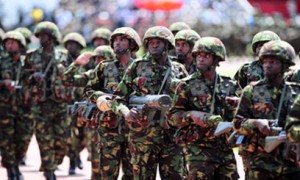Kenya: Opposition coalition and other groups threaten to protest over growing insecurity
 Several groups have vowed to take to the streets if the Kenyan government continues to ignore their calls to immediately address the country’s security problems.
Several groups have vowed to take to the streets if the Kenyan government continues to ignore their calls to immediately address the country’s security problems.
Since the beginning of this year, terrorists have carried out a series of deadly attacks in the country. According to experts, about 64 people have been killed and more than 260 injured in these deadly incidents.
Last week, former Prime Minister and head of the Coalition for Reform and Democracy (CORD), Raila Odinga, announced plans for nationwide protests next month to pressurize the government to heed the group’s concerns about the worsening security situation and the general under-performance of the Jubilee administration.
According to him, CORD cannot wait for the next general elections in 2017 to express their grievances. He has, therefore, directed the authorities to convene a forum for national dialogue to address these issues.
However, local sources say the Jubilee administration has treated this development with mistrust. Reports indicate that the country’s security agencies have been tasked to investigate the motives for the upcoming rallies. Meanwhile, Members of Parliament have reportedly set out to convince their electorates of the futility of protesting and the need to be patient with the administration.
On Thursday, a group of 27 local civil society and human rights advocacy groups also vowed to take to the streets within a week if the authorities fail to address their concerns over the failing security situation and commit to withdrawing from Somalia.
According to their statement to the press, the crackdown on Somali refugees has not resolved the underlining security issues that have plagued the country. Instead, they say the operation has been a blanket for a long list of human rights abuses; including torture, illegal detention, rape, extortion and forceful relocation.
Since the crackdown on illegal migrants began about two months ago, reports indicate that more than 4,000 people have been taken into custody. About 2,000 of them are reported to have been relocated to overcrowded and impoverished refugee camps in the northern region of the country, while more than 350 have been deported back to Somalia.
The Somali government has also condemned the security exercise and urged Kenya to immediately end the operation. However, the Somali government boycotted a meeting with Kenya and the United Nations Refugee Agency last month to workout a plan for repatriating the refugees.
About 420,000 Somali asylum seekers are believed to be in Kenya, according to official sources. While it remains unclear why the Somali government pulled out of the meeting, some experts say it is in protest against the mistreatment of Somali nationals in the neighbouring country.
Meanwhile, the 27 civil society groups have asked the government to provide evidence to shed light on the role(s) of foreign nationals in terrorist attacks in the country. They have also accused the police of failing to protect Muslim leaders from threats on their life.
Kenyan officials have since expressed suspicion that terrorists from Somalia camouflage as asylum seekers to infiltrate the country and complete their destructive plots. These fears were given credence after investigators disclosed that the gunmen who carried out the attack on the Westgate mall last year had entered the country under the pretext of seeking refuge.
al Shabab have reiterated their vow to attack neighbouring countries to force their withdrawal from Somalia. But, the Kenyan government has insisted on remaining in the war-torn country until its security is guaranteed.
Kenya’s clampdown on illegal refugees has also been criticized by many international human rights advocacy groups, including Amnesty International and Human Rights Watch. The Kenyan government has been urged to adopt other ways of hunting for terrorists among asylum seekers; besides blanket encampment measures and ‘scapegoating’ foreign nationals.
According to Human Rights Watch, “In committing these violations, Kenya is backtracking on important human rights commitments made in the constitutional, legislative, and institutional reforms after the widespread 2007/2008 post-election violence, and risking further unrest.”
Last month, the United States, United Kingdom, Australia and France issued travel warnings to their citizens after intelligence reports uncovered plots to attack western interests in the east African country. Local reports indicate that British nationals were evacuated from Mombasa at the height of the warnings.
But several top Kenyan officials have questioned the motive behind these warnings, which, according to them, seems calculated to hurt the country’s tourism industry.
However, earlier in the month, the U.S. Ambassador to Kenya, Robert Godec, noted that the travel warning issued by his government was neither a political statement nor was it designed to create economic problems.
He went on to note that the U.S. will continue to support Kenya in her battle against Islamic extremism. Mr. Godec further announced that certain measures will be effected to improve the security of U.S. interests in the country.
Meanwhile, the Kenyan government has announced plans to drastically increase its spending on security in the next fiscal year.
Reports indicate that the Treasury has allocated about Sh155 billion for the country’s security agencies.
According to Treasury Secretary, Robert Rotich, Sh71.2 billion has been reserved for the army, Sh66.2 for the police, Sh17.4 billion for the intelligence agencies and Sh6.7 billion for the purchase of vehicles, airplanes and other equipments for the security agencies.
Mr. Rotich went on to announce plans to install close-circuit television cameras in major cities across the country and also recruit about 10,000 new police officers.
Kenyan officials have since relayed a new strategy which prioritizes the improvement of the country’s security apparatus in order to guarantee economic development.
Experts say despite the negative press these terrorist attack have brought Kenya, the development of east Africa’s fastest growing economy has not really been affected.
Photo/Xinhua